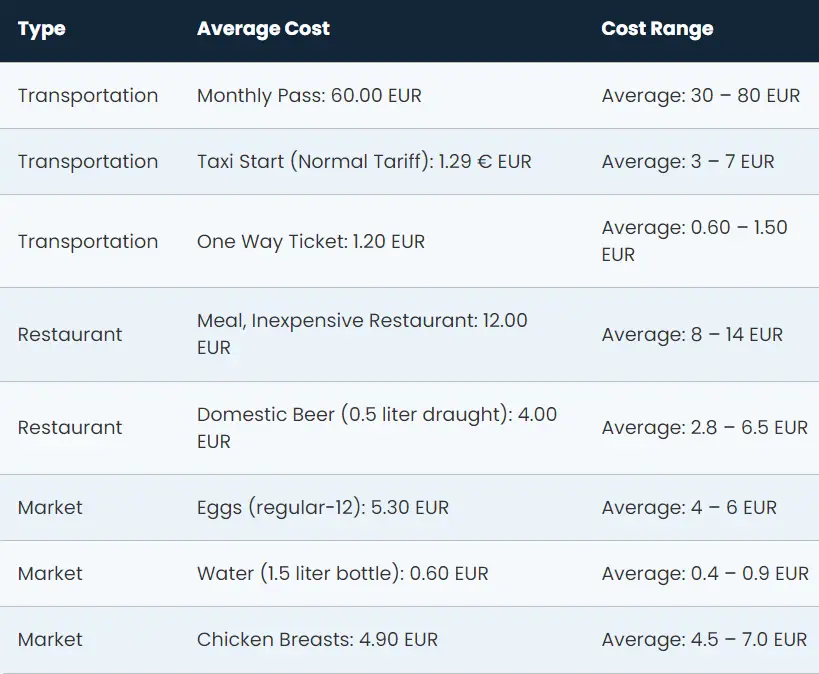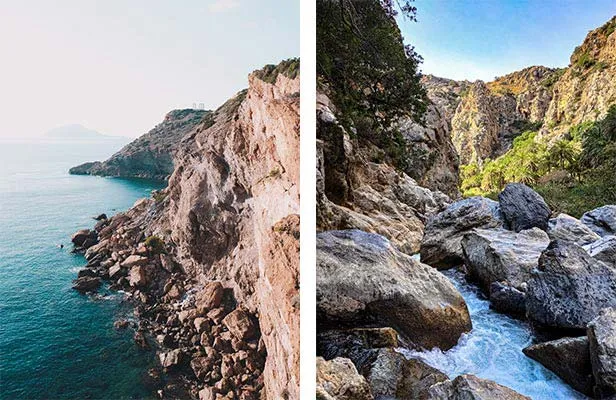How to Find a Property in Crete, Greece.
How to Find Your Dream Property in Crete: A Comprehensive 7-Step Guide.
For many, buying property in Crete, Greece, is the ultimate dream. With careful planning, a dedicated team of real estate experts, and the right know-how, this dream can become a reality. To help you identify the ideal property in Chania, Rethymnon, Heraklion, or Lassithi, we’ve put together a comprehensive guide covering the entire purchasing process from start to finish.
At ARENCORES, we work alongside our trusted partners to facilitate your decision-making and guide you through the often tricky and risky path to home ownership in Crete, ensuring your purchase goes smoothly.
In the following sections, you will discover compelling reasons to buy commercial or residential property in Crete. We will then outline the step-by-step buying process. For more detailed information, download your free Crete Buying Guide.


The Ultimate Guide to Buying Property in Crete.
At ARENCORES, we have distilled over 14 years of experience into the ultimate guide to buying property in Crete. Our comprehensive resource offers practical tips and strategies for identifying, assessing, and purchasing the ideal property in Chania.
Whether you’re a first-time buyer or an experienced investor, our guide provides valuable insights and essential information to navigate the complex real estate market in Crete, ensuring a smooth and successful property acquisition.
At ARENCORES, we have published extensive information on finding property in Crete, Greece. Our website features a series of dedicated guides for property buyers and real estate investors, offering practical tips and strategies to identify, assess, and purchase the ideal property in Chania and beyond.
However, it can sometimes be overwhelming to locate all the necessary information in one place. That’s why we’re sharing everything we’ve learned about searching for and purchasing property in Crete over the past 14 years, all in one comprehensive guide. This guide encapsulates our extensive experience and the valuable lessons we’ve learned along the way.
Whether you’re looking to buy a property in Crete or are a real estate investor or developer, we guarantee you’ll find something useful in this guide.
With over 85% of properties now listed online, the vast array of options can be both a blessing and a challenge. Thousands of properties, varied locations, different asking prices, and potential risks need to be considered before taking the next steps.
For first-time buyers, this can quickly become overwhelming when starting to search for properties in Chania, Rethymnon, Heraklion, or Lassithi without knowing where or how to begin their real estate journey in Crete.
In our previous Chania Property Buyers Guide, we covered many fundamental aspects of the purchasing process, highlighting their significant impact on the success of your property acquisition. Today, we delve into practical steps you can take to find a property in Crete, including the objective factors that determine a property’s value. We’ll also share invaluable resources that have guided us in our journey.
Should you Buy Property in Crete, Greece?
Are you curious about why Crete stands out as a prime destination for real estate investment? Real estate ventures vary widely from person to person, each journey fraught with its own risks and rewards. Finding a property in Crete presents its unique set of challenges and opportunities.
However, there are definitive steps you can take to steer yourself in the right direction and lay the groundwork for investment success. Listening to advice from seasoned real estate professionals and successful investors serves as an excellent starting point.
Many expatriates are drawn to living in Crete either permanently or seasonally in their vacation homes. While you may already be familiar with the island’s renowned attractions such as its delectable cuisine, vibrant culture, stunning beaches, and agreeable climate, there are deeper, more practical reasons driving people’s decision to relocate here.
Crete boasts esteemed public academic institutions, an extensive transportation network connecting it to mainland Greece and numerous European cities, all at relatively affordable rates compared to many European capitals.
Furthermore, Crete offers a lower cost of living without compromising on the standard of living or quality of life, although navigating this aspect requires careful consideration.
FAQs about Buying Property in Crete.
It is absolutely worth buying real estate in Crete, Greece for foreigners. Buying a residential or commercial property in Crete can establish high investment returns, and allow investors to get residency in one of the most beautiful countries in Europe.
Depending on the lifestyle you seek, Crete offers boundless opportunities. From the serene shores of Zakros to the picturesque village of Palaiochora, and from the bustling city of Heraklion to the charming town of Chania, there are exceptional properties awaiting discovery. Delve deeper into the possibilities with our dedicated guides.
Is Buying a Property in Crete a Good Investment?
We asked 45 property purchasers. Here’s what they said.
Properties for Sale in Chania
Off-Market Properties

Not quite convinced? Here are some of the facts of living in Crete:
1. Affordable Properties to Buy in Crete
Looking to find a property in Crete but unsure about the average property prices? Crete’s real estate market is known to be quite expensive compared to other islands in Greece. Factors like proximity to popular beaches, views, and the age of construction significantly influence the asking prices.
Understanding the Market
To purchase a renovation project in Chania Old Town, Rethymnon City, or near the popular area of Elounda, Lassithi, first-time buyers need to have earnings considerably higher than the national average. However, much of rural Crete remains deeply affordable.
Finding a Property You Can Afford
When buying a property in Crete, consider swapping more expensive areas like Agia Marina, Chania for more affordable alternatives such as Apokoronas, or choosing Vlichada in Rethymnon instead of Panormos. You’ll find property prices can be lower by over €800/m².
Many properties for sale are within a few minutes’ drive from the beach, popular seaside resorts, or towns. Here, you can benefit from lower property prices while still enjoying all the amenities and facilities you need close by.
For example, €140,000 might get you a one-bedroom apartment in Pithari, Akrotiri area, Chania, or a two-bedroom flat in Mastabas, Heraklion. For the same price in Makris Gialos, Lassithi, you can buy a detached three-bedroom maisonette with a big garden.
Additionally, for the same asking price, you can find an ideal land property to invest in, potentially offering a high return on your investment in the short term compared to other areas.
Comparative Property Prices
Unlike other areas in Greece like Santorini, Mykonos, Corfu, and the Athens Riviera, where residential properties are rare and often overpriced, the best property prices in Greece are in rural areas, small Aegean and Ionian islands, and the sunny South, where the wonderful island of Crete is located.
Perfect for International Buyers
This is great news for sun-loving Scandinavians, Brits, Germans, and Russians wanting to make their vacation home in the beautiful Cretan countryside with views of the Aegean or the Libyan Sea. Crete offers a unique blend of affordability, beauty, and a high quality of life that is hard to match elsewhere in Greece.
Since our last survey, we have found that an increasing number of first-time buyers aged 35-55 are considering property investment in Crete. Although this group feels more economically stable, they are not convinced this stability will last. Having weathered four recessions in their lifetime, including the COVID-19 crisis, only a small percentage (17%) are confident that the economy in their country of origin will remain strong.
Economic Confidence and Property Investment Interests Among First-Time Buyers (Aged 35-55).
This graph shows the breakdown of confidence in the economy and interest in property investment in Crete among the surveyed group. You can use these percentages to create a pie chart to visually represent this data.
2.Lower Cost of Living in Crete
Cost of Living Overview
Looking to find a property in Crete but wondering about the average cost of living? The cost of living in Crete has risen since 2018, as Greece slowly recovers from the economic crisis of the last decade. Basic goods and fuel on the Greek islands, including Crete, tend to be more expensive than on the mainland due to transportation costs from the port of Piraeus and Athens.
Saving on Groceries and Essentials
Significant savings can be made at the large supermarket chains of Crete (SYN.KA, Sklavenitis, Vasilopoulos, Kritikos, Chalkiadakis) by buying their own-label products. Additionally, local farmers’ markets, commonly known as ‘laiki,’ offer a wide range of fresh local produce, including fruit, fish, and vegetables, at lower prices compared to similar products at large supermarkets.
Housing and Services Costs
As of January 2021, prices for most services are rising. Rents in the major cities of Crete (Agios Nikolaos, Chania, Heraklion, and Rethymnon) are increasing rapidly. However, property prices outside these cities remain relatively fair. Medical services costs continue to rise, but transportation costs are much lower than the EU average. Overall, consumer goods prices in Crete are fairly competitive.

Affordable Shopping and Dining
Crete offers a large selection of reasonably priced clothing and footwear, even when there are no sales. During sales periods, household equipment such as electrical goods and furniture can be found at discounted prices. Winter sales run from mid-January to mid-February (maximum five weeks), and summer sales from mid-July to the end of August.
Eating out in Crete is still delicious and relatively inexpensive, especially away from the main tourist areas. Cretan cuisine and restaurants are largely affordable, typically costing €11.00–22.00 per person for a substantial meal with house wine. The best strategy is to dine where the locals go, often in less obvious backstreet places that might not look impressive from the outside but offer the best value and quality. The two most common types of restaurants are the estiatorio and the taverna.
Monthly Living Expenses
The total cost of living in Crete is approximately €810 per month. Here’s a breakdown of typical expenses:- Rent: The average rent for a one-bedroom apartment in the city center is around €490 per month.
- Utilities: Utilities, including electricity, heating, cooling, water, and garbage, cost about €120 per month.
- Other Costs: Other monthly expenses, including transportation, eating out, groceries, and leisure activities, amount to around €470 for one person.
Is Crete Expensive to Live In?
Crete is relatively affordable compared to many other European destinations. However, with the average monthly salary being €790, living comfortably might require earning more than this amount.Average Salary in Crete
The average salary in Crete is approximately €790 per month (after tax), which is not tied to specific qualifications. This amount is slightly below the average cost of living, which is €810 per month, indicating that many residents may need to budget carefully or supplement their income to cover their expenses.Average Rent in Crete
- City Center: Renting a one-bedroom apartment in the city center of Heraklion or Chania costs around €490 per month.
- Outside City Center: If you choose to live outside the city center, the rent drops to about €380 per month for a similar apartment.

3.Perfect Transport Links in Crete
Certainly! Here’s the content with links included:
3. Perfect Transport Links in Crete
Air Travel
Crete boasts excellent transport options, making it accessible from various parts of the world. The island has two international airports:
- Heraklion International Airport Nikos Kazantzakis in the capital, Heraklion.
- Chania International Airport Ioannis Daskalogiannis in the western region.
Additionally, a new airport in Kasteli is under development and is expected to become Greece’s second biggest, replacing the current airport in Heraklion. In eastern Crete, the smaller Sitia Public Airport mostly receives domestic flights and less frequent international charters from cities like Oslo, Stockholm, and Bergen.
Airlines and Flight Connections
All the airports in Crete are served by Aegean Airlines, along with low-cost carriers such as Sky Express, Ryanair, and EasyJet. From the UK, Ryanair and EasyJet fly to Crete from Gatwick Airport and London Heathrow, offering competitive prices throughout the year.
From Scandinavia, SAS flies to Crete from Oslo, Copenhagen, or Stockholm. From Germany, Aegean Airlines and Lufthansa connect Crete with Frankfurt, Düsseldorf, and Munich. Flights from Athens to Crete usually take less than 45 minutes, with additional connections from Thessaloniki and Kalamata in the Peloponnese.
Ferry Services
Tourists can also travel to Crete by ferry from the Piraeus port in Athens. There are daily itineraries connecting Piraeus to Chania and Heraklion year-round. During the summer, ferries may also connect to Agios Nikolaos and Rethymnon.
The port of Heraklion offers regular routes to Rhodes and Santorini, two of Greece’s most popular destinations. From Kissamos port in Chania, there are ferry connections to Kythira, Antikythira, and Gythio in the Peloponnese.
The port of Sitia in Lassithi connects with the islands of Kasos and Karpathos, and during the summer, local ferries to the Dodecanese depart from Agios Nikolaos. Additionally, the port of Palaiochora in Chania serves ferries to Gavdos island three times a week during the summer.
Crete’s well-developed transport links make it an easily accessible destination, whether by air or sea, ensuring a convenient travel experience for both residents and visitors.
Perfect Transport Links in Crete
Air Travel
Crete is home to two major international airports, making it highly accessible for international and domestic travelers.
- Heraklion International Airport Nikos Kazantzakis: As the second largest airport in Greece, it receives non-stop passenger flights from 111 destinations in 27 countries, as well as 7 domestic flights.
- Chania International Airport Ioannis Daskalogiannis: This airport receives non-stop passenger flights from 58 destinations in 20 countries, along with domestic flights to Athens and Thessaloniki.
Airlines Flying Direct to Crete
Some of the most popular airlines with direct flights to Crete include:
- Aegean Airlines
- Lufthansa
- SAS
- EasyJet
- British Airways
- Iberia
- Finnair
- Norwegian Air
- SWISS
- Brussels Airlines
Low-cost and charter airlines that fly to Crete are:
- EasyJet
- Ellinair
- TUI Fly
- Eurowings
- Ryanair
- Volotea
- Jet2
- Corendon Airlines
Ferry Services
Crete is also well-connected by sea, with several ferry companies providing regular services.
Minoan Lines
- Available Vessels: Festos Palace and the high-speed Knossos Palace.
- Routes and Timetables: For more information, visit the Minoan Lines homepage.
Anek Superfast
- Available Vessels: F/B Blue Galaxy (Blue Star Ferries), F/B Elyros (Chania), and Kriti I (Heraklion) from ANEK Lines.
- Routes and Timetables: For more information, visit the ANEK Lines homepage.
These extensive air and sea transport links make Crete easily accessible and ensure a convenient travel experience for both residents and visitors.
4. Exceptional Climate
Mediterranean Bliss
Crete basks in a predominantly Mediterranean climate, characterized by mild, occasionally rainy winters and sunny, hot, and usually dry summers. However, the island’s topographical diversity, encompassing lowland plains and rugged mountains, creates a tapestry of micro-climates, ensuring a diverse experience for visitors. Despite the variations, you can expect to revel in approximately 2000 hours of sunshine annually.
Regional Variations
The mildest weather typically graces the coastal areas and southern regions, including the serene island of Gavdos. In the island’s southern reaches, winter temperatures rarely plummet to freezing levels, while summers often soar to 35°C or higher.
Heraklion Area: A Weather Overview
In the vibrant city of Heraklion, January stands as the coldest month, with temperatures averaging around 12.5 °C (54.5 °F). Conversely, August reigns as the warmest month, boasting an average temperature of approximately 26.4 °C (79.5 °F). Despite the chill of winter, Heraklion enjoys an abundance of sunshine, with February heralding the onset of warmer days suitable for sundresses, al fresco dining, and even a refreshing dip in the sea.
| April | May | June | July | August | September | October | |
|---|---|---|---|---|---|---|---|
| Air | 17 | 24 | 24 | 27 | 27 | 26 | 21 |
| Sea | 17 | 19 | 22 | 26 | 26 | 25 | 23 |
Chania Area: Where Nature’s Symphony Unfolds
Nestled in the western embrace of Crete, the Chania area unveils a captivating tale of seasons, where winter’s frosty breath mingles with summer’s warm caress, painting a portrait of contrasts against the canvas of time.
Winter Whispers, Summer Dreams
Winter arrives in the western reaches of Crete with the arrival of December, casting its spell until March, occasionally lingering into April. Here, amidst the rugged terrain of the White Mountains, expect a spectacle of snow-capped peaks and temperatures dipping below freezing, all under the watchful gaze of a sun that generously bestows its radiance upon the land.
The Meltemi, a gentle breeze from the northwest, graces Chania from mid-May, lending a touch of coolness to the air, though with a gentler demeanor than its counterparts in the central Aegean islands. Rainfall, a rare guest between April and October, finds its voice between November and March, weaving a tapestry of nourishment across the land.
Coastal Charms, Southern Serenity
Along the pristine shores of Chania, where the azure waters meet golden sands, the sea breeze dances with abandon, tempering the summer heat that envelops the coast. Here, under the embrace of the Libyan Sea to the south, temperatures rise to their zenith, offering a haven of warmth where the average maximum temperature ranges between 32°C and 36°C.
July’s Embrace, January’s Chill
In the heart of summer, July reigns supreme in Chania, with an average temperature of 26°C (79°F), inviting travelers to indulge in the bliss of sun-soaked days and starlit nights. Conversely, January holds sway as the coldest month, with an average temperature of 12.2°C (54.0°F), a testament to winter’s gentle grip upon the land, yet even in its chill, the promise of adventure beckons.
Lassithi Area: Nature’s Haven
Nestled at the southernmost tip of the captivating island of Crete, the Lassithi area beckons with its idyllic blend of warm summers and invigoratingly brisk winters. Blessed with a Mediterranean climate, this region experiences delightfully dry and sunny summers, ideal for leisurely strolls along its scenic landscapes and basking in the golden glow of the sun.
Summer Serenity, Winter Wonder
During the summer months, Lassithi’s embrace is a haven of warmth and tranquility, offering respite from the bustling world. The winters, though characterized by their wild and blustery nature, maintain a certain rugged charm. Unlike its counterparts in Chania and Rethymnon, Lassithi receives considerably less rainfall, with its western expanse enjoying almost as many sun-drenched days as the sun-kissed southern shores of Crete.
A Rare Encounter with Winter’s Touch
Snowfall and harsh weather conditions are a rarity in Lassithi, further enhancing its allure as a year-round destination for those seeking both serenity and adventure amidst nature’s splendor. Whether it’s the vibrant colors of summer or the quiet majesty of winter, Lassithi invites exploration and promises unforgettable experiences in every season.
| April | May | June | July | August | September | October | |
|---|---|---|---|---|---|---|---|
| Air | 17 | 24 | 24 | 27 | 27 | 26 | 21 |
| Sea | 17 | 19 | 22 | 26 | 26 | 25 | 23 |
Rethymnon Area: Where Seasons Paint a Vivid Canvas
Embracing a tapestry of hot, dry summers and mild, rainy winters, the Rethymnon area epitomizes the enchanting diversity of Crete’s climate. Here, amidst a landscape adorned with historic charm and natural splendor, each season whispers its own tale, painting the canvas of time with hues of warmth and tranquility.
Summer Splendor, Winter Whispers
Summer in Rethymnon unfolds with a symphony of scorching sunrays and azure skies, inviting travelers to immerse themselves in the allure of its sun-kissed shores. As August reigns supreme with its balmy embrace, the average temperature dances around 26.5 °C (79.7 °F), setting the stage for endless adventures under the Cretan sun.
Come winter, Rethymnon dons a gentler cloak, welcoming the soothing touch of rain and the occasional mild chill. With January gracing the land with its lowest average temperature of 12.4 °C (54.3 °F), the air carries whispers of ancient tales amidst the misty veil of rain.
Winds of Change, Rainfall Symphony
The Rethymnon region is not without its theatrics, as strong north and south winds sweep across its landscapes, painting the skies with dynamic strokes of movement. From autumn until April, a chorus of rainfall serenades the land, a signature melody of the Mediterranean climate that breathes life into the earth.
Journey to the Libyan Sea
Venture southward to the shores of the Libyan Sea, and you’ll discover a subtle shift in the air, where temperatures rise gently, and the specter of snow and ice becomes a distant memory. Here, in this tranquil expanse, nature unfolds its grandeur with grace, inviting travelers to bask in the timeless beauty of Crete’s southern coast.
| April | May | June | July | August | September | October | |
|---|---|---|---|---|---|---|---|
| Air | 17 | 24 | 24 | 26 | 27 | 25 | 21 |
| Sea | 17 | 19 | 22 | 25 | 26 | 24 | 23 |
5. Crete: Where Nature Meets Heritage
The landscapes of Crete are not just breathtaking; they’re internationally acclaimed, recognized by UNESCO for their unparalleled beauty and historical significance. From the majestic Minoan palatial centers of Knossos, Phaistos, Malia, Zakros, and Kydonia to the rugged grandeur of the Samaria Gorge, each site is a testament to the island’s rich cultural and natural heritage.
Verdant Oases and Olive Groves
Cypress, oak, pine, plane, chestnut, and palm forests adorn the island, while vibrant orange and olive groves paint the landscape in hues of green and gold. The southern regions of Lassithi, Heraklion, Rethymnon, and Chania serve as the heartland of Crete’s olive oil production, dominating the terrain with their sprawling groves.
It’s no wonder that Crete boasts nine PDO (Protected Designation of Origin) regions, a testament to the island’s commitment to preserving its rich agricultural traditions.

Blue Waters and Golden Sands
Crete’s allure extends beyond its lush landscapes, beckoning travelers with its crystal-clear blue waters and sun-kissed beaches. Whether you’re seeking adrenaline-fueled adventures or tranquil moments of relaxation, Crete offers endless possibilities.
Dive into the depths of the Aegean or Libyan Sea, explore underwater caves teeming with marine life, or embark on a scenic trek through the island’s mountainous terrain. From surfing and sailing to snorkeling and scuba diving, Crete promises unforgettable experiences amidst stunning natural beauty.

6. A Gastronomic Delight: Exploring Cretan Cuisine
A Gastronomic Delight: Exploring Cretan Cuisine
In Crete, food isn’t just sustenance; it’s a vibrant expression of culture and community. The island’s culinary landscape is a mosaic of flavors, each region offering its own unique dishes crafted from locally sourced ingredients.
A Tapestry of Flavors
From the fertile plains to the rugged mountains, Crete’s diverse terrain influences its cuisine, resulting in a rich tapestry of flavors and aromas. Fresh fruits and vegetables, creamy dairy products, farm-fresh eggs, and succulent locally raised meats form the cornerstone of Cretan gastronomy. Whether it’s the simplicity of a Greek salad or the complexity of a slow-cooked lamb dish, every bite is a celebration of Crete’s culinary heritage.
Secrets of Success
At the heart of Cretan cuisine lie five secrets: the use of high-quality, fresh ingredients; the skillful integration of indigenous herbs and spices; the liquid gold of Greek olive oil; a dash of creativity; and the beauty of simplicity. These elements combine to create dishes that are both flavorful and nourishing, embodying the essence of the Mediterranean diet.
Culinary Treasures
No exploration of Cretan cuisine would be complete without sampling its culinary treasures. From traditional dishes like Dakos, Kaltsounia, and Fried Snails to delicacies such as Lamb with Stamnagathi and Gamopilafo, each bite tells a story of tradition and innovation. And let’s not forget the island’s exceptional wines, crafted from indigenous grape varieties that have been cultivated since ancient times.
A Wine Lover’s Paradise
Crete’s winemaking tradition dates back millennia, with the island boasting a vibrant wine culture that continues to thrive today. From the crisp whites of Vidiano to the bold reds of Liatiko, Crete’s wines are as diverse as its landscape. With over 80 producers scattered across the island, including acclaimed wineries in Chania and Sitia, there’s no shortage of opportunities to sample the island’s liquid treasures.
Heraklion: The Epicenter of Wine
While wine production is spread across the island, Heraklion stands as the beating heart of Crete’s winemaking industry. Home to a majority of the island’s producers, Heraklion’s terroir has been producing wines since the days of the Minoans. Today, it remains a mecca for wine enthusiasts, offering a tantalizing glimpse into Crete’s vinicultural heritage.
7. Embracing Tradition: The Vibrant Culture of Crete
Cretan culture is a tapestry woven from centuries of history, regional pride, and a deep-seated love for life. From spirited music and dance to a fierce sense of independence, the people of Crete embody a rich cultural heritage that is as vibrant as it is resilient.
A Legacy of Resilience
Throughout history, Cretans have faced numerous challenges, from conquests by foreign powers to the struggle for independence. Yet, they have never faltered in their commitment to preserving their traditions and way of life. Today, this multicultural melting pot stands as a testament to the resilience and tenacity of the Cretan people.
A Cultural Cornucopia
Venture beyond the bustling cities of Heraklion, Chania, Agios Nikolaos, and Rethymnon, and you’ll discover a world where local dialects, regional delicacies, and age-old customs come to life. From the intricate architecture of traditional villages to the vibrant sounds of folk music echoing through the streets, every corner of Crete is steeped in culture and tradition.
Kefi: The Joy of Life
At the heart of Cretan culture lies “kefi” – a Greek word that encompasses the zest for life, passion, and joyful exuberance that defines the island’s inhabitants. Whether it’s through lively festivals, spirited dances, or simple moments spent with family and friends, Cretans embrace life with an infectious enthusiasm that is impossible to resist.

Festivals: Celebrating Life
No visit to Crete is complete without experiencing one of its legendary festivals, known as “panigiria.” These joyous celebrations offer a glimpse into the soul of Greece, with music, dance, and feasting lasting late into the night. From religious ceremonies to community gatherings, these festivals are a testament to the island’s rich cultural heritage.
Family and Community
Family lies at the heart of Cretan culture, with multi-generational gatherings and late-night “volta” – leisurely strolls – through the streets a common sight. Whether sharing a meal with loved ones or gathering with friends at a local taverna, Cretans cherish the bonds of family and community that define their way of life.
Average Asking Prices in Chania & Heraklion
| Rent Per Month | Heraklion | Chania | Percentage Difference |
|---|---|---|---|
| Apartment (1 bedroom) in City Centre | 340.00 € | 390.00 € (Tzanakaki Street) | +14.7 % |
| Apartment (1 bedroom) Outside of the City | 287.00 € | 340.00 € (Agios Onoufrios) | +18.4 % |
| Apartment (3 bedrooms) in City Centre | 680.00 € | 690.00 € (Chrissi Akti) | +1.70 % |
| Apartment (3 bedrooms) Outside of Centre | 510.00 € | 560.00 € (Akrotiri Area) | +9.80 % |
| Apartment Price (Selling Asking Price) | Heraklion | Chania | |
| Price per Square Meter to Buy Apartment in City Centre | 1,670.00 € | 1,700.00 € (Nea Chora) | +1.79 % |
| Price per Square Meter to Buy Apartment Outside of Centre | 1,284.00 € | 1,344.00 € (Agia Marina) | +4.67 % |
Moving into Crete and finding an apartment in Chania, Rethymnon or Heraklion has become stressful and mentally challenging for anyone on an average salary and looking to rent or buy.
According to our research, rents rose 7.2 percent on average between 2014 and 2020 throughout Crete. However, if we focus on the city centers of Chania, Rethymnon, Agios and Heraklion, which attract large numbers of tourists and investors, median rental prices per sq.m. have almost increased by 23.5 % compared to 2012.
What’s the Approximate Cost of Different Properties in Crete?
The cost of property in Crete is largely dependent on the type of property, the features and benefits of that property (the value), the overall real estate market, supply and demand, and what other similar properties have sold for in the same condition and size.
| Location | Property Type | Size (sq.m) | Property Price (euro) |
|---|---|---|---|
| Chersonisos (Heraklion Prefecture) | Land Plot | 630000 | 1,500,000 |
| Heraklion City | Land Plot | 333 | 130,000 |
| Rethymnon (Κοumpes) | Land Plot | 1200 | 1,200,000 |
| Rethymnon (Sfakaki) | Land Plot | 1000 | 110,000 |
| Plaka (Agios Nikolaos) | Land Plot | 3285 | 365,000 |
| Makris Gialos (Lasithi Prefecture) | Land Plot | 23000 | 980,000 |
| Nea Kidonia (Chania Prefecture) | Land Plot | 5800 | 185,000 |
| Location | Property Type | Size (sq.m) | Property Price (euro) |
|---|---|---|---|
| Kato Elounta, Agios Nikolaos | Detached House | 250 | 520,000 |
| Heraklion City | Apartment | 100 | 215,000 |
| Rethymnon (Spili) | Detached House | 156 | 250,000 |
| Chania Old Town | Detached House | 114 | 400,000 |
| Chania City Center | Apartment | 140 | 210.000 |
| Chania (Apokoronas) | Villa | 340 | 780,000 |
| Kato Elounta, Agios Nikolaos | Villa | 340 | 1,950,000 |
Market Value VS Market Price
The major difference between market value and the market price is that the market value, in the eyes of the property owner – the seller, might be much more than what a potential buyer will pay for the property. Obviously, property value can create demand, which can also significantly influence the price.
Yet, without the demand parameter, property value itself cannot influence the price. As supply increases and demand decreases, the price goes down, and value is not a strong influential parameter. As supply decreases and demand increases, the price will rise, and value will influence the price.
It is also very common that buyers and sellers can view value completely different. A property seller might feel that their 85.00 sq.m. pool is a benefit, but the buyer could see it as a negative in terms of maintenance costs or sustainability and place less value on the property.
Or the seller could feel the new roof and solar panels they put on the house has great value; however, the potential buyer places no value on this because they expect the property to have a roof and solar panels in good condition.



